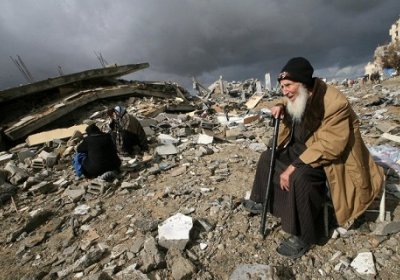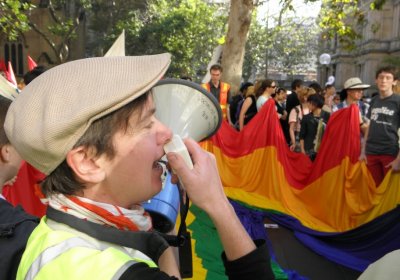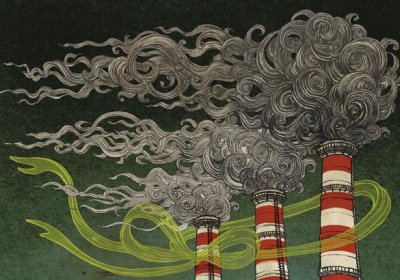Protests across Bahrain that began on February 14 have rocked the US-backed Khalifa royal family, mobilising hundreds of thousands of people against the regime's repressive rule.
881
Springtime: The New Student Rebellions
Edited by Claire Solomon and Tania Palmieri
Verso 2011 283 pages,
paperback, £9.99
In years to come, when people look back at 2010-11 and try to identify the moment the fightback against the British Conservative-Liberal Democrat coalition really got under way, many will select the huge March 26 TUC-sponsored demonstration in London.
Magnificent and inspiring as March 26 was, however, November 10, 2010 has perhaps a greater claim to be recorded as the moment the fightback began in earnest.
About 20,000 people took part in Switzerland's biggest anti-nuclear march in 25 years on May 22, Swissinfo.ch said that day.
“Chanting and waving placards, anti-nuclear protesters marched in two groups to the site of Beznau, Switzerland’s oldest nuclear power plant which is located in canton Aargau,” the article said.
Organisers said about 150 political parties and environmental organisations joined the march.
The home of Nabeel Rajab, president of the Bahrain Centre for Human Rights (BCHR) was attacked on May 21, CNN.com said that day. It was the second attack on Rajab's house in a month.
The BCHR said the attack occurred in the early hours of the morning while Rajab and his family were sleeping. It said the attackers launched teargas grenades into the house, breaking the window of Rajab's brother, the group said.
On June 27, 1985, four anti apartheid activists were brutally murdered on behalf of the South African government. Twenty five years later, their killers still walk free.
The murders of these four men illustrate one of the darkest passages of South Africa’s history.
South African filmmaker David Forbes has directed, edited and produced the film The Cradock Four to tell the story of these four extraordinary men.
What are some examples of highly offensive words that must be censored from radio? For British state broadcaster BBC, they are not all of the four-letter variety.
The BBC appears to find not just the phrase “Free Palestine” but even the geographical entity of the Gaza Strip itself unutterable on a cultural show.
A controversy has broken out over the BBC's anti-Palestinian bias after its digital radio channel BBC 1xtra, which largely plays hip hop, grime and other “urban music” genres, censored on air references to Palestine.
“EPA: Extreme Pollution A-OK” read a banner held up by protesters outside Victoria’s Environmental Protection Authority (EPA) as it announced on May 20 a partial approval for the HRL Dual Gas project, which will use brown coal for electricity generation.
With a record 4000 submissions to the EPA opposing the project, the Stop HRL campaign group reacted with a spot protest outside the EPA during the announcement and a further protest of over 300 outside state parliament on May 24.
Sixty-two percent of Australians support equal marriage rights. This support has risen from the 33% who backed same-sex marriage in 2004 — the year gay marriage was banned.
This rise in support has been a result of the grassroots campaign waged by activists with rallies, politician visits, media stunts, Mardi Gras floats, petitions and others mobilisations.
In Sydney, Community Action Against Homophobia (CAAH) has organised rallies since June 2004.
It took Arrow Energy more than 24 hours to cap a major gas well blow-out. The well sprayed water and methane up to 90 metres in the air on a farming property west of Dalby in Queensland.
The leak took place on May 22 when the well was being prepared for production.
The leak was not reported to authorities until two hours after it occurred, and it took the gas company a further four hours to inform property owner Tom O'Connor.
The worst thing about the Labor government’s proposed carbon price scheme is that it’s a diversion from real action on climate change.
The Australian media, collectively, does a dismal job of telling the story of our silent apartheid, the space between black and white Australians.
The new assimilation, well underway in the Northern Territory, has the same intent as government policies of past eras, still aiming to change Aboriginal people, restrict the importance of their law, language and cultural practice, and move many from their ancestral lands into new housing estates that, we are promised, will materialise magically in great little Aussie growth towns.
The Western Australia Liberal government recently said its lucrative prisoner transport contract with private security firm G4S would end in July. Another private company, the British-based conglomerate Serco, will take over. The move came after a long campaign against G4S and the WA department of corrective services over the death of Aboriginal man Mr Ward, who died of heat stroke in a G4S van during a 360 kilometre trip in January 2008. The state coroner said G4S was directly responsible for Mr Ward’s awful death.
- Previous page
- Page 2
- Next page








